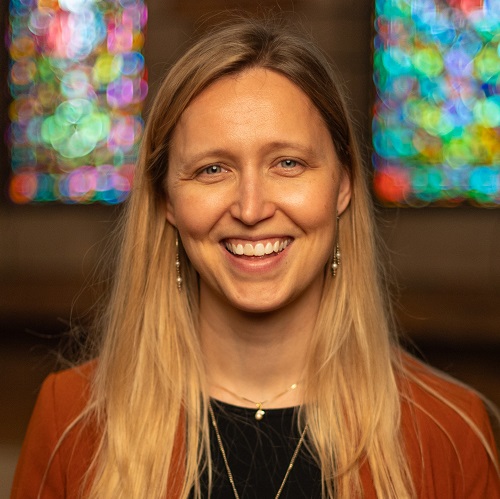Commentary on Genesis 32:22-31
This beautiful story leaves its listeners hanging on every word. It offers a blessing in the midst of liminality, that terrible and wonderful in-between stage of limbo.1 Genesis 32 depicts liminality in all of its pain and all of its potential. Jacob stands squarely on the threshold to a blessed new existence characterized by a limp, a shifted reality and a changed body. This pericope is, perhaps, the best description of the life of faith in the entire Bible.
First, some context: Jacob is stuck between a rock and a hard place—or better yet, a campfire and an inferno. His truce with his in-laws (Genesis 31) will likely only last as long as they keep their distance. The only other place to turn is directly toward his family of origin trauma.
The story of Jacob’s nighttime wrestlings may be familiar to many. Do not rush it. As recognizable as this story is to ministry professionals, surely not everyone listening will know it well. If you know this story well, start by slowing down and reflecting: what is it about this story, this text, that has moved you in the past? What detail caused it to settle under your skin?
Once you have pinpointed the heart of the story for yourself, dive into the compelling nature of the narrative. Take your time with the words and imagery. Draw out for your listeners the conflict, drama, and trauma that has led up to this climactic point. Hover over the image of the wives, slaves, and children sneaking away under the light of the moon. Witness Jacob, stripped of everything he has, totally and utterly alone. Marvel at the perfect description of a night spent wrestling with the Creator.
Once you have helped your people drink deeply from the gorgeous imagery, turn with them towards the concept of liminality. While liminality overwhelms Jacob’s night, it is difficult to pinpoint a time in Jacob’s life that is not marked by the touch of the liminal. Esau is born first, but Jacob emerges from the womb linked to his brother’s body. A man by birth, he lives in the women’s tents and cooks, eschewing traditional gender roles. He is the second-born child, but he acquires both his brother’s birthright and his brother’s blessing. He dreams of a conduit between heaven and earth, and stands beside the Maker of the Universe. He rises to success but in a foreign land. Even his marriages bear the mark of liminality, with one wife beloved but barren, the other unloved but powerful in birth. And the list goes on.
This concept of liminality bears much fruit in a sermon. In his recent dissertation, Adam Engel explores the concept of liminality in 20th-century literature. While this may seem an odd place to turn for sermon inspiration, the author’s description of liminality—and its effects —offers a wealth of preaching potential:
- Engel writes that liminality offers a space in which people can “challenge their bodies’ boundaries.2” In this text, Jacob challenges the boundaries between his human body and the bod(ies) of God.
- Engel describes liminal spaces as those that can “challenge hierarchies [and] reimagine connections between individuals.”3 In his liminal night, Jacob turns topsy-turvy the hierarchy between mortal and immortal. His wrestling reimagines the abilities and limits of both the human and the Divine.
- Engel demonstrates that “To cross the threshold into liminal space is to confront all of these possibilities, and to emerge—if at all—with shifted bodily boundaries.”4 In the liminal space of one evening, Jacob confronts a myriad of possibilities, including losing everything he has; losing everyone he loves; and losing his own life at the hand of his God. He emerges from this confrontation with his physical identity shifted—a limp—and with his internal identity changed, thanks to a new name: Yiśrāʾēl, Israel, One Who Wrestles With God.
Jacob-Israel’s experience of his liminal night may not have contained all that he had hoped: he asked for the name of God, but he was denied; his body will forever bear the brunt of his theophanic encounter. And yet, the final, gorgeous image of this text suggests that perhaps, somehow Jacob has learned to, as Engel writes, “embrace the transient world [he] inhabit[s]:”5 “The sun rose upon him as he passed Penuel, limping because of his hip” (Genesis 32:31). The sun rose upon him, as he stepped off the liminal threshold. The sun rose upon him, as he limped toward the final encounter with his brother. In spite of whatever struggles, wrestlings, or weepings the liminal night contained, the sun rose upon him in the morning (Psalm 30:5).
A surprising number of people experience a disorienting in-between stage at any given time. That number skyrockets in situations of national trauma or upheaval. The description of Jacob’s threshold experience may be relief to some or hit too close to home to others. Either way, your sermon can offer them language to use to describe their experience, and hope to sustain them through liminality to new life.
Notes
- Liminal space is the space between times, between physical settings. In this space, the rules of the conventional world are temporarily suspended. Liminal spaces are places of tension where the past has gone, the future has not yet begun, and transformation can happen.
- Adam Engel, “Between Two Worlds: The Functions of Liminal Space in Twentieth-Century Literature,” (PhD dissertation, University of North Carolina at Chapel Hill, 2017), abstract.
- Engel.
- Engel.
- Engel.


October 16, 2022